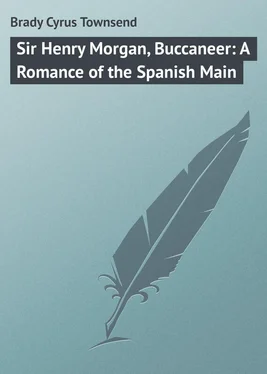Cyrus Brady - Sir Henry Morgan, Buccaneer - A Romance of the Spanish Main
Здесь есть возможность читать онлайн «Cyrus Brady - Sir Henry Morgan, Buccaneer - A Romance of the Spanish Main» — ознакомительный отрывок электронной книги совершенно бесплатно, а после прочтения отрывка купить полную версию. В некоторых случаях можно слушать аудио, скачать через торрент в формате fb2 и присутствует краткое содержание. Жанр: foreign_prose, на английском языке. Описание произведения, (предисловие) а так же отзывы посетителей доступны на портале библиотеки ЛибКат.
- Название:Sir Henry Morgan, Buccaneer: A Romance of the Spanish Main
- Автор:
- Жанр:
- Год:неизвестен
- ISBN:нет данных
- Рейтинг книги:3 / 5. Голосов: 1
-
Избранное:Добавить в избранное
- Отзывы:
-
Ваша оценка:
- 60
- 1
- 2
- 3
- 4
- 5
Sir Henry Morgan, Buccaneer: A Romance of the Spanish Main: краткое содержание, описание и аннотация
Предлагаем к чтению аннотацию, описание, краткое содержание или предисловие (зависит от того, что написал сам автор книги «Sir Henry Morgan, Buccaneer: A Romance of the Spanish Main»). Если вы не нашли необходимую информацию о книге — напишите в комментариях, мы постараемся отыскать её.
Sir Henry Morgan, Buccaneer: A Romance of the Spanish Main — читать онлайн ознакомительный отрывок
Ниже представлен текст книги, разбитый по страницам. Система сохранения места последней прочитанной страницы, позволяет с удобством читать онлайн бесплатно книгу «Sir Henry Morgan, Buccaneer: A Romance of the Spanish Main», без необходимости каждый раз заново искать на чём Вы остановились. Поставьте закладку, и сможете в любой момент перейти на страницу, на которой закончили чтение.
Интервал:
Закладка:
Kempthorne, having been a tried and a successful naval commander in his younger days, had striven, with some success so far as his own ship was concerned, to stem the prevailing tide of ruin, and the Mary Rose was perhaps one of the best frigates in the service, which, however, was not saying a great deal. He could not, of course, better the character of the crew which had been provided for him, nor could he entirely re-supply the ship, or make good her faulty and deficient equipment, but he did the best he could. Under ordinary circumstances he could have given a good account of himself if engaged with even the perfectly appointed ships of the Dutch Republic, or of the Grand Monarch himself. Indeed, in spite of the horrible degeneracy, the prestige of victory was still, as it has ever been, with England. King James, a successful, even brilliant naval commander in his youth, had decided to rehabilitate the navy with a view to putting it on its old footing, and with that object in view he had sent one of his best admirals across the sea to the important island of Jamaica, then the headquarters of the West India Squadron.
Kempthorne had welcomed the duty, and had determined that so far as the station at Port Royal was concerned he would make it the model one of the colonies, of the kingdom itself for that matter, provided he were sustained by the King as had been promised. Lord Carlingford, with the zeal of a new appointee, had promised his coöperation.
The admiral was seated in the cabin of the frigate that night cogitating upon his plans, when his thoughts were interrupted by the rattle of oars, indicating the arrival of a boat. The sound of the approaching boat came faintly through the open stern windows of the cabin under the high poop-deck.
The ship was more or less deserted. The sick men had been put ashore; most of the crew, and the officers as well, had followed them. They would not be back until the morrow, when Sir John had orders to get away in pursuit of Hornigold's pinnace. With the captain in the cabin, however, was the old master of the ship, a man who had been promoted to that rank after the famous fight with the Algerines because of his gallantry in that action. Kempthorne was consulting with him about the necessary arrangements before sailing the next day.
As the admiral heard the noise made by the oars in the oarlocks he raised his voice, and calling a sentry, for there was half a platoon of soldiers on board who had not yet been allowed liberty (the beginnings of the Royal Marine of England, by the way), he bade him ascertain if the approaching boat was that containing the Governor. It was still early evening, and Lord Carlingford had announced his intention of sleeping in the ship, for the weather was intensely warm and he thought it might be cooler in the harbor than in the crowded low-lying town of Port Royal.
At the same time the admiral arose, buckled on his sword, and made ready to go on deck to meet Lord Carlingford, should it prove to be his expected visitor. Pausing a moment to say a final word to the master, he was conscious of something striking the ship. Before he could formulate the idea that a boat must have been hit in the bends, there were several similar shocks. The old master, who happened to be unarmed, stepped forward.
"That will be a boat, sir," he said quickly, "striking against the side of the ship. There's another, and another!"
His voice indicated surprise and some apprehension. What could it be?
"Let us go on deck at once," said Kempthorne, stepping forward. As he did so the silence was broken by a wild, terrified cry. A moment after, the sentry on the quarter-deck outside the entrance to the poop cabin fired his piece. The shot was followed by the sound of a fierce blow, and then a heavy fall. A sharp, imperious voice cried quickly:
"The ship is ours! Waste no time! Overboard with him! Clap to the hatch covers!"
The necessity for concealment outside was apparently at an end. The heavy covers were flung down upon the hatches and secured. The ship was filled with a confused babel of many voices and trampling feet. At the sound of the shot, the admiral and the master sprang to the door, but before they could pass the entrance it was flung violently open, and a man richly dressed after the fashion of Jamaica, followed by a tall, savage-looking half-breed, a compound of negro and Indian, clad in a gorgeous livery, each with pistol and sword, sprang into the room and forced the two men back. As soon as he could recover himself Kempthorne whipped out his sword. He found himself covered, however, as did the master, with a pistol.
"Throw down your sword!" cried Morgan fiercely, "and yield yourselves without quarter."
"Who are you that ask?"
"Sir Henry Morgan."
"You bloody villain!" cried Kempthorne. "Dare you attempt to take the King's ship?"
"That for the King!" answered Morgan, waving his sword. "Who are you?"
"Sir John Kempthorne, Admiral and Vice-Governor of Jamaica."
"You would fain fill my station, would you, sir?"
"I would not descend to the station of a pirate, a robber, a murderer, a – "
"S'death, silence!" roared Morgan furiously. "The ship is ours! I've a message for the King. Wilt carry it?"
"I would not insult my royal master by carrying a message from such as you."
"You will have it!" shouted Morgan, white with rage, lunging forward at him.
Their blades crossed in an instant, and at the same moment the old master, reckless of what happened, flung himself between the two. There was a roar from Carib's pistol, and the old man fell. As Kempthorne relaxed his guard slightly in the confusion Morgan ran him through. The admiral fell so suddenly that he jerked the blade, buried in his breast, out of the buccaneer's hand.
"God – " he gasped, as he lay upon the body of the old sailor, "God – save the – King."
"Would'st sit in my place, eh?" cried Morgan, laughing truculently as he turned on his heel and left the cabin.
Beneath the hatches, the platoon of soldiers and the men there imprisoned were yelling and making a tremendous racket. They were helpless, however, and could do nothing. The men of the boarding parties were clustered in groups forward and aft and around the closed passageways into the interior of the ship, waiting for the next order.
The noise and confusion which had followed the sentry's bold shot had awakened the attention of the people of the town. Lights twinkled on the ramparts of the fort, and the long roll of a drum could be heard coming faintly up the harbor against the wind. Lord Carlingford had just entered his boat to board the ship. There was not a moment to lose.
"Hornigold, go forward with your men to the forecastle. Velsers, come you hither with yours for the after guard. Teach, to the fore; Raveneau, to the main; and Rock, to the mizzenmast. Loose sail. Lively now. We must get out of this before the fort's awake," cried Morgan.
Instantly the shrouds were covered with nimble forms making their way aloft where the wide yard-arms stretched far over the sea. The men were in good spirits. The capture of the ship had been so easy; there had been only the anchor watch and the sentry on deck to deal with, and they had been murdered unsuspecting, although the cabin sentry had killed one of the attacking party and wounded another before he went down. They jumped with alacrity, therefore, to obey their captain's commands. As the ponderous sheets of canvas fell from the yards, the men lay down from aloft, and sheets and halyards were manned, the cable that moored the vessel to the anchor was cut, the ship swung to starboard, the yards were braced in, and she began to slip through the water toward the narrow mouth of the harbor. There were other war vessels in the harbor, but they were all dismantled and laid up in ordinary, so the buccaneers had no pursuit to fear.
Читать дальшеИнтервал:
Закладка:
Похожие книги на «Sir Henry Morgan, Buccaneer: A Romance of the Spanish Main»
Представляем Вашему вниманию похожие книги на «Sir Henry Morgan, Buccaneer: A Romance of the Spanish Main» списком для выбора. Мы отобрали схожую по названию и смыслу литературу в надежде предоставить читателям больше вариантов отыскать новые, интересные, ещё непрочитанные произведения.
Обсуждение, отзывы о книге «Sir Henry Morgan, Buccaneer: A Romance of the Spanish Main» и просто собственные мнения читателей. Оставьте ваши комментарии, напишите, что Вы думаете о произведении, его смысле или главных героях. Укажите что конкретно понравилось, а что нет, и почему Вы так считаете.












